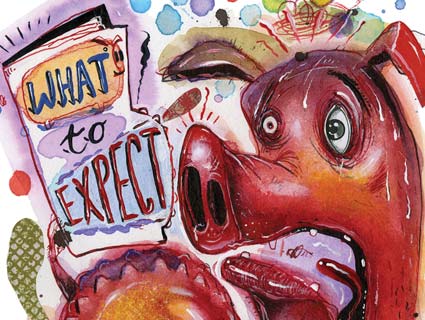| Mar. 1990 |
Kansas adopts the country’s first ag gag law, making it illegal for a person to enter a private animal facility to take pictures or video if they have “intent to damage the enterprise conducted at the facility.” |
| Nov. 1990 |
Washington apple growers sue CBS for $250 million over a 60 Minutes episode alleging that the Alar chemical sprayed in orchards puts children at risk of cancer. The case is ultimately dismissed; Alar is taken off the market. |
| 1991 |
Montana prohibits recording “with the intent to commit criminal defamation,” while North Dakota bans filming without the owner’s consent. |
| Jan. 1991 |
Colorado introduces the first “veggie libel” law, allowing ag producers to sue those who disparage their products. The governor vetoes the bill, but over the next six years, Colorado and 12 other states pass such laws, in some cases shifting the burden of proof to the party being sued. |
| 1992 |
ABC PrimeTime Live reporters document Food Lion employees grinding expired beef with fresh beef and applying barbecue sauce to expired chicken to mask the smell. Food Lion sues ABC for fraud and trespass and is awarded $5.5 million. An appellate court reduces it to $2, saying the lawsuit tried to “end run” the First Amendment.  |
| June 1996 |
The Texas Beef Group sues Oprah Winfrey for $11 million for an interview with a Humane Society of the United States (HSUS) representative who declared that mad cow disease was a potential epidemic worse than AIDS, to which Winfrey remarked, “It has just stopped me cold from eating another burger.” Beef prices drop 7 cents per pound. The jury ultimately rules in favor of Oprah. 
|
| Oct. 1997 |
Texas emu ranchers sue Honda for an ad in which a young job searcher is told, “Emus, Joe. It’s the pork of the future.” Ranchers claimed the line would make emu meat less appealing to Muslims and Jews. The case is dismissed. 
|
| 1999 |
A three-month PETA investigation of pig farms leads to the first-ever felony indictments of farmworkers for animal cruelty. |
| 2003 |
The American Legislative Exchange Council (ALEC) introduces model legislation that would create a “registry of animal and ecological terrorists” and prohibit recording in an animal or research facility “with the intent to commit criminal activities or defame the facility or its owner.” |
| 2006 |
The Animal Enterprise Terrorism Act, inspired by ALEC’s model legislation, is signed into law by President George W. Bush. |
| 2008 |
PETA’s multi-month investigation of Iowa’s MowMar Farms documents workers abusing pigs with metal rods and electric prods, and results in six convictions. |
| Jan. 2010 |
A Washington state senator introduces a law that labels anyone who protests animal and natural-resource facilities a terrorist. The bill, which borrows heavily from ALEC’s model legislation, dies in committee. |
| Nov. 2010 |
The HSUS films workers at Willmar Poultry Co. throwing sick, injured, and surplus birds into grinders alive. |
| Dec. 2010 |
The HSUS’s undercover investigation of a Smithfield facility shows sows confined inside small gestation crates. Safeway, Costco, Burger King, and Subway announce they will not buy from suppliers who use crates; Smithfield pledges to phase them out by 2017. |
| 2011 |
Ag gag laws are introduced in five states and pass in two. |
| Nov. 2011 |
Undercover footage gathered by Mercy for Animals shows workers suffocating birds in plastic bags and hens crammed in dirty cages at Sparboe Farms, an egg supplier to McDonald’s and Target. Both companies drop Sparboe. |
| July 2012 |
Missouri is the first state to pass an ag gag law that emphasizes “quick reporting“: Those who suspect abuse “must provide the recording to a law enforcement agency within 24 hours” or face charges. |
| Sept. 2012 |
Beef Products Inc. files a $1.2 billion lawsuit against ABC News for its “pink slime” investigation. 
|
| Feb. 2013 |
Amy Meyer becomes the first to be charged under an ag gag law. Standing outside the barbed-wire fence enclosing the Smith Meatpacking slaughterhouse, Meyer videotapes “flesh being spewed from a chute on the side of the building” and a downer cow being carried by a tractor. The co-owner of the slaughterhouse is also the town’s mayor. Charges are dropped after blogger Will Potter publicizes the case. |
| April 2013 |
When his ag gag bill clears the Tennessee state House, Rep. Andy Holt emails the HSUS and calls its investigations “tape and rape” by “a pathetic group of sensationalists who seek to profit from animal abuse.” The governor vetoes his bill. |
| June 2013 |
Ag gag laws have been introduced in 12 more states. Seven emphasize quick reporting, while Arkansas’ makes it illegal for anyone except law enforcement to investigate improper conduct. |











